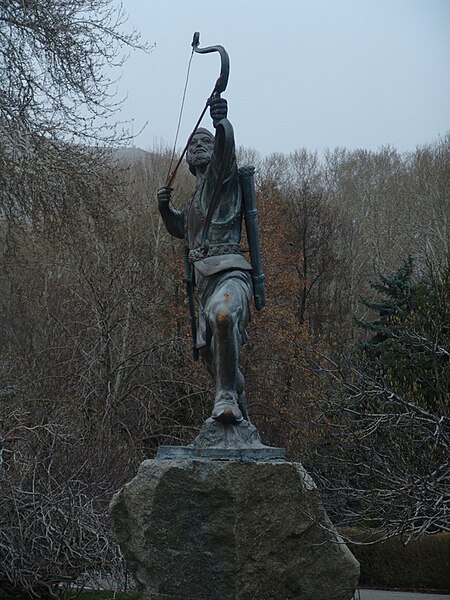Rostam or Rustam is a legendary hero in Persian mythology, the son of Zāl and Rudaba, whose life and work was immortalized by the 10th-century Persian poet Ferdowsi in the Shahnameh, or Epic of Kings, which contains pre-Islamic Iranian folklore and history. However, the roots of the narrative date much earlier.
Rostam mourning Sohrab. Persian miniature.
Rostam in the murals of Panjikent, 7-8th century CE. He is represented with an elongated skull, in the fashion of the Alchon Huns.
Rostam kills Esfandiyār. Medieval Persian miniature
Rostam and Kay Kavus in castle
Iranian mythology, or Persian mythology in western term, is the body of the myths originally told by ancient Persians and other Iranian peoples and a genre of ancient Persian folklore. These stories concern the origin and nature of the world, the lives and activities of deities, heroes, and mythological creatures, and the origins and significance of the ancient Persians' own cult and ritual practices. Modern scholars study the myths to shed light on the religious and political institutions of not only present-day Iran but of the Persosphere, which includes regions of West Asia, Central Asia, South Asia, and Transcaucasia where the culture of Iran has had significant influence. Historically, these were regions long ruled by dynasties of various Iranian empires, that incorporated considerable aspects of Persian culture through extensive contact with them, or where sufficient Iranian peoples settled to still maintain communities who patronize their respective cultures. It roughly corresponds to the Iranian Plateau and its bordering plains.

Faramarz slaying Ahriman - a scene from the Shahnameh.
Detail of The School of Athens by Raphael, 1509, showing Zoroaster (left, with star-studded globe)
Chinvat Bridge scene on the sarcophagus of Wirkak.
Statue of Arash, Sa'dabad Complex.








